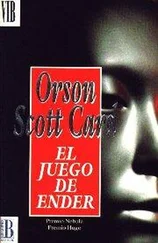Orson Card - Ender in exile
Здесь есть возможность читать онлайн «Orson Card - Ender in exile» весь текст электронной книги совершенно бесплатно (целиком полную версию без сокращений). В некоторых случаях можно слушать аудио, скачать через торрент в формате fb2 и присутствует краткое содержание. Жанр: Фантастика и фэнтези, на английском языке. Описание произведения, (предисловие) а так же отзывы посетителей доступны на портале библиотеки ЛибКат.
- Название:Ender in exile
- Автор:
- Жанр:
- Год:неизвестен
- ISBN:нет данных
- Рейтинг книги:3 / 5. Голосов: 1
-
Избранное:Добавить в избранное
- Отзывы:
-
Ваша оценка:
- 60
- 1
- 2
- 3
- 4
- 5
Ender in exile: краткое содержание, описание и аннотация
Предлагаем к чтению аннотацию, описание, краткое содержание или предисловие (зависит от того, что написал сам автор книги «Ender in exile»). Если вы не нашли необходимую информацию о книге — напишите в комментариях, мы постараемся отыскать её.
Ender in exile — читать онлайн бесплатно полную книгу (весь текст) целиком
Ниже представлен текст книги, разбитый по страницам. Система сохранения места последней прочитанной страницы, позволяет с удобством читать онлайн бесплатно книгу «Ender in exile», без необходимости каждый раз заново искать на чём Вы остановились. Поставьте закладку, и сможете в любой момент перейти на страницу, на которой закончили чтение.
Интервал:
Закладка:
What galled her was the worshipful way the colonists treated her. When she had been a student in Battle School, she was merely ordinary. Being a girl made her different, and she had to struggle to hold her own — but she was no Ender Wiggin, no legend. She wasn't much of a leader. That would come later, when she was back in India, with people she understood, blood of her blood.
The problem was that these colonists were overwhelmingly Indian. They had volunteered for the colonization program precisely because Virlomi would be the governor of the colony — several of them told her that they had competed in a lottery for the chance to come. When she went among them, to talk to them, get to know them, she found it nearly futile. They were in such awe of her they became tongue-tied, or when they managed to speak, their words were so formal, their language so lofty, that there was no chance of real communication.
They all acted as if they thought they were talking to a goddess.
I did my work too well during the war, she told herself. To Indians, defeat was not a sign of the disfavor of the gods. What mattered was how she bore it. And she could not help it — she kept her dignity, and to them she seemed godlike because of it.
Maybe this will make it easier to govern them. Or maybe it will make the day of their disillusionment a terrible thing to behold.
A group of colonists from Hyderabad came to her with a petition. "The planet has been named Ganges, for the holy river," they said, "and that is right. But can we not also remember the many of us from the south? We speak Telugu, not Hindi or Urdu. Can we not have a part of this new colony that belongs to us?"
Virlomi answered them in fluent Telugu — she had learned it because she could not have fully united India if she spoke only Hindi and English — and told them that she would do what the colonists allowed her to do.
It was the first test of her leadership. She went among the people and asked them, dormitory by dormitory, whether they would accept naming the village they would build in the new world "Andhra," after the province whose capital was Hyderabad.
Everyone agreed with her proposal instantly. The world would be named Ganges, but the first village would be Andhra.
"Our language must be Common," she said. "This breaks my heart, to submerge the beautiful languages of India, but we must all be able to speak to each other with one voice, one language. Your children must learn Common in their homes, as the first language. You may also teach them Hindi or Telugu or any other language, but Common first."
"The language of the Raj," said one old man. Immediately the other colonists shouted at him to be respectful to Virlomi.
But Virlomi only laughed. "Yes," she said. "The language of the Raj. Conquered once by the British, and again by the Hegemony. But it is the language we all have in common. We of India because the British ruled us for so long, and then we did so much business with America; the non-Indians because it is a requirement to speak Common or you cannot come on this voyage."
The old man laughed with her. "So you remember," he said. "We have a longer history with this so-called 'Common' than anyone but the English and the Americans themselves."
"We have always been able to learn the languages of our conquerors and then make them our own. Our literature becomes their literature, and theirs becomes ours. We speak it our own way, and think our own thoughts behind their words. We are who we are. Nothing changes."
This was how she spoke to the Indian colonists. But there were others, about a fifth of the colonists, who were not from India. Some had chosen her because she was famous, and her struggle for freedom had captured their imagination. She was the creator of the Great Wall of India, after all, and so they thought of her as a celebrity and sought after her for that reason.
But there were others who were assigned to Ganges Colony by the luck of the draw. It was Graff's decision, to allow no more than four-fifths of the colonists to come from India. His memo had been concise: "There may come a day when colonies can be founded by one group alone. But the law of these first colonies is that all humans are equal citizens. We are taking a risk letting you have so many Indians. Only the political realities in India made me bend from the normal policy of no more than one-fifth from any one nation. As it is, we have now demands from Kenyans and Darfurians and Kurds and Quechua speakers and Mayans and other groups that feel the need for a homeland that is exclusively their own. Since we're giving one to Virlomi's Indians, why not to them? Do they need to fight a bloody war in order to. etc., etc. That is why I have to be able to point to the twenty percent who are not Indian, and why I need to know that you will in fact make them equal citizens."
Yes, yes, Colonel Graff, you will have it all your way. Even after we arrive on Ganges and you are lightyears away and can no longer influence what we do, I will keep my word to you and encourage intermarriage and equal treatment and will insist on English — pardon me, Common — as the language of all.
But despite my best efforts, the twenty percent will be swallowed up. In six generations, five generations, three perhaps, visitors will come to Ganges and find blond and redheaded Indians, freckled white skins and ebony black skins, African faces and Chinese faces and yet they will all say, "I am Indian," and treat you with scorn if you insist that they are not.
Indian culture is too strong for anyone to control. I ruled India by bowing to Indian ways, by fulfilling Indian dreams. Now I will lead Ganges Colony — the village of Andhra — by teaching the Indians to pretend to be tolerant of the others, even as they befriend them and bring them inside our ways. They will soon realize that on this strange new world, we Indians will be the natives, and the others the interlopers, until they "go native" and become part of us. It can't be helped. This is human nature combined with Indian stubbornness and patience.
Still, Virlomi made it a point of reaching out to the non-Indians here in Battle School — here on the Way Station.
They accepted her well enough. Now her fluency in Battle School Common and its slang stood her in good stead. After the war, Battle School slang had caught on with children all over the world, and she was fluent in it. It intrigued the children and young people, and amused the adults. It made her more approachable to them, not so much of a celebrity.
In the barracks — no, the dormitory — that used to be for newly arrived students — launchies, as they were called — there was one woman with a babe in arms who remained steadfastly aloof. Virlomi was content with that — she didn't have to be everyone's favorite person — but soon it became clear, as she visited that barracks more and more, that Nichelle Firth was not just shy or aloof, she was actively hostile.
Virlomi became fascinated by her and tried to find out more about her. But the biography in her file was so sparse that it made Virlomi suspect it was bogus; there were several like that, belonging to people who were joining the colony specifically to leave all their past, even their identity, behind them.
There was no talking to the woman directly, however. Her face became a pleasant blank and she answered succinctly or not at all; when she chose not to answer, she smiled with a set jaw, so that despite the toothy grin Virlomi was aware of the anger behind it. She did not push the matter further.
But she did watch for Nichelle's reactions to things Virlomi and others said when Nichelle was within earshot, but not part of the group. What seemed to set her off, what made her huffy in her body language, was any mention of the Hegemony or Peter Wiggin or the wars on Earth or the Free People of Earth or the Ministry of Colonization. Also the names of Ender Wiggin, Graff, Suriyawong, and, above all, Julian Delphiki — «Bean» — seemed to make her hold tightly to her baby and start to whisper some sort of incantation to the child.
Читать дальшеИнтервал:
Закладка:
Похожие книги на «Ender in exile»
Представляем Вашему вниманию похожие книги на «Ender in exile» списком для выбора. Мы отобрали схожую по названию и смыслу литературу в надежде предоставить читателям больше вариантов отыскать новые, интересные, ещё непрочитанные произведения.
Обсуждение, отзывы о книге «Ender in exile» и просто собственные мнения читателей. Оставьте ваши комментарии, напишите, что Вы думаете о произведении, его смысле или главных героях. Укажите что конкретно понравилось, а что нет, и почему Вы так считаете.











